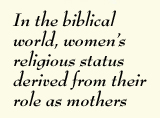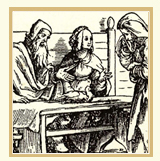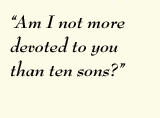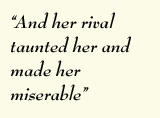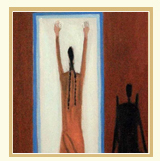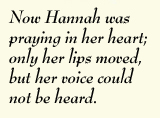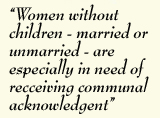Hannah’s Barrenness
Introduction
The narrative of Elkanah, Hannah and Peninah revolves around barrenness. This motif is well known to biblical readers by way of earlier triumvirates such as Abraham, Sarah and Hagar, and Jacob, Rachel and Leah.
Although Elkanah had a second wife named Peninah, little is known about his relationship with her. In contrast, his bond with Hannah is described in detail. The text speaks of his unconditional love for her; and yet despite his devotion and reassurance, her pain and emptiness were intolerable. As the barren wife, Hannah struggled with feelings of loneliness and inadequacy as a woman. Moreover, in the biblical world, a woman’s religious status derived from her role as a mother. Hannah had not only been deprived of children, she was denied the tender moments of participating in the annual family pilgrimage to Shiloh, and playing an active role as the mother at the ritual meals.
One such day, Elkanah offered a sacrifice. He used to give portions to his wife Peninah and to all her sons and daughters; but to Hannah he would give a double portion because Hannah was his favorite and the Lord had closed her womb. Moreover, her rival to make her miserable would taunt her that the Lord closed her womb. This happened year after year. Every time she went up to the House of the Lord the other would taunt her, so that she wept and would not eat. Her husband Elkanah said to her, “Hannah why are you crying and why aren’t you eating? Why are you so sad? Am I not more devoted to you than ten sons?
(1Sam 1:4-8)
The annual family gatherings only accentuated Hannah’s emptiness. Whenever Elkanah offered a sacrifice, he would give portions to his wife Peninah and to all her sons and daughters. To add to her misery, Hannah’s rival Peninah would taunt her about her empty womb every time she went up to the House of the Lord.
Peninah’s Taunting
Moreover, her rival, to make her miserable, would taunt her that the Lord closed her womb. This happened year after year. (1 Sam. 1:6)
In describing Peninah’s treatment of Hannah, Scripture repeats the word “anger” three times, stressing the frequency (link to the third midrash: In Pesikta Rabbati 43:8 the Rabbis turn her verbal abuse into a daily occurrence: “When Peninah would taunt Hannah it was a taunt within a taunt. What would she do? Rabbi Nahman in the name of Abba said: Peninah would wake up early and say to Hannah, “Why aren’t you getting up to wash your children’s faces so they can go to school? At noon she would say, “Why aren’t you going to fetch your children from school?” That is the meaning of “her rival to make her miserable would taunt her.”) and intensity of Peninah’s torment of Hannah.
The text does not specify the content of her derision, leaving the embellishment to midrashic texts:
And her rival taunted her and made her miserable. She taunted her again and again, what did she say? Have you bought your eldest son a jacket? Your second, a robe in order to rue her.
(Midrash Samuel 1:8)
Midrash Samuel portrays Peninah teasing Hannah about buying coats for the children. Insofar as the coat is the symbol of leadership in the Book of Samuel, the dramatic irony resounds. For the moment, Hannah is unable to furnish her son with a robe, but one day it is he who will don the mantle of leadership.
Additional descriptions of the complicated relationship between Hannah and Peninah, and Peninah’s incessant vexation resonate in other midrashic explanations as well:
Rabbi Tanhuma in the name of Rabbi Abba said: They would sit down to eat and Elkannah gave each and every one of his sons his portion. What did Peninah do? To provoke Hannah she would say to Elkannah, “Give this one – my son – his portion. You didn’t give that one – my son – his portion. Why? In order to upset her (Hannah).
(Pesikta Rabbati 43:8)
This midrashic exposition is anchored in the text. The grief and psychological abuse which Peninah hurls upon Hannah occurs within the context of the family’s sacrificial meal. Peninah takes the opportunity to pour salt on Hannah’s open wounds. The midrash seizes upon the nature of Hannah’s vulnerability. She has not only been deprived of children, she is denied the family context of being an active participant in ritual meals where the maternal role takes on significant religious expression. [1]Rabbi Joseph B. Soleveitchik, “The Community: Majesty and Humility; Catharsis, Redemption, Prayer, and Talmud Torah; A Tribute to the Rebbitzen of Talne” (Rebecca Twersky) in Tradition 17,2 (1978), pp. 7-83.
Elkanah’s Resignation
Year after year Hannah put up with the vexation of her rival wife. Finally, she reached the point at which she vowed to consecrate to God the son she longs for. This was not only a function of Peninah’s agonizing words, but also a response to the statement of her loving husband Elkanah: “Hannah why are you crying and why aren’t you eating? Why are you so sad? Am I not more devoted to you than ten sons?” (1 Sam, 1:7–8). We are left wondering precisely what Elkanah meant and what Hannah understood. These questions are debated by contemporary thinkers. (link) One approach is that Hannah suddenly internalized Elkanah’s complete resignation to her childless state. Hannah was not prepared to give up. It was this which served as a catalyst for her daring entry into the House of the Lord.
Coping with Infertility
Elkanah may have made peace with this reality, but for the barren mother coping with infertility the struggle was unrelenting.
One philosophical attempt to afford perspective to barren women and ameliorate their existential pain and loneliness, is found in the commentary of Rabbi Isaac Arama:
Now after he (Adam) saw what resulted from his association with her (Eve)—the evil and the curse—he gave her a different name which exclusively described her femininity; the name Chava, as he explained “she is the mother of all living things,” that is to say that her primary purpose is not to be his wife but rather to perpetuate humankind like other living things. [In contrast], when it comes to spiritual fulfillment that is left for man alone. However, these two names (of Eve — Chava and Isha) explain that women have two purposes. The first, Isha, indicates that she was taken from man and is like him. She can understand and contemplate wisdom and goodness as was the case with the matriarchs and several righteous women and prophetesses. This is evidenced in Proverbs 32: “Eshet chayil mi yimza . . . .” (A righteous woman (eshet from the word Isha) who can find?) The second (name) relates to her birthing power; (she is) a vessel for birthing and raising children, which is evidenced by the name Chava meaning “she was the mother of all living things”.
Therefore, a woman who does not give birth for some reason may not achieve the latter function – the lesser function of her existence – maintains her purpose regarding good or evil, and in this regard she is like a man who does not have children. This purpose is equal for them both . . . .
Therefore, Jacob became furious with Rachel when she said, “Give me children or else I shall die.” He rebuked her to teach her this important idea that she was not dead since she shared their joint purpose even if she couldn’t bear children. And what the rabbis said that a barren one is like a dead person (b.Nedarim 64b) they meant in terms of leaving progeny in this world. In conclusion, one name is a function of woman having been taken from man and the second is as we have explained. (Genesis 2:8)
This tension between the two “purposes” of the life of a woman has no doubt troubled women—fertile and barren—throughout history. Lynn Gottlieb, a contemporary thinker, attempts to address this tension by creating a new ceremony for childless women to perform:
Why this ceremony? Women without children—married or unmarried—are especially in need of receiving communal acknowledgment, both of the sadness they may feel at being childless and of their own creativity and achievements.
Lynn Gottlieb, “The Fruits of Creation,” in Debra Orenstein (ed.), Lifecycles, Vermont: Jewish Lights Publishing, 1994, p. 40
In the Fruits of Creation Seder Ceremony, Gottlieb provides a response to infertility that not only mourns the loss of a possibility and a dream, it also celebrates the creative powers that women own and exercise, regardless of their fertility.
Penina Adelman, challenged by infertility and miscarriage, describes a different approach. She grieved her loss by creating a ritual for miscarriage, using Hannah as her model—Ritual of Loss: Fertility and Infertility. The ritual is based on her own version of the story, which is a synthesis of the original text, its commentaries and her identification with Hannah through the experience of infertility. She believes that as teffilin and mezuzah are sometimes perceived as protective amulets for those who use them, so the study of Hannah’s story might protect one from further loss, and offer guidance, solace and encouragement.
References
| ↑1 | Rabbi Joseph B. Soleveitchik, “The Community: Majesty and Humility; Catharsis, Redemption, Prayer, and Talmud Torah; A Tribute to the Rebbitzen of Talne” (Rebecca Twersky) in Tradition 17,2 (1978), pp. 7-83. |
|---|
